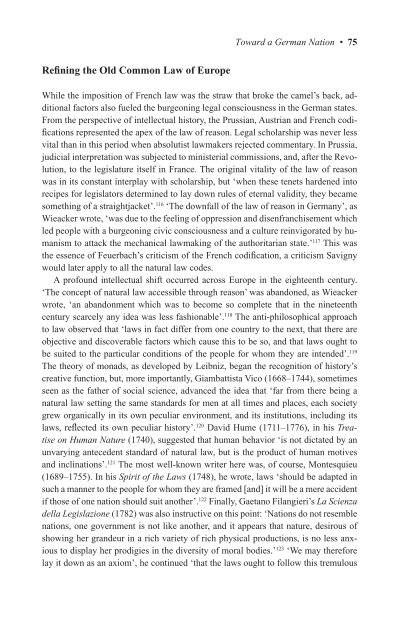Making of a German Constitution : a Slow Revolution
Making of a German Constitution : a Slow Revolution
Making of a German Constitution : a Slow Revolution
You also want an ePaper? Increase the reach of your titles
YUMPU automatically turns print PDFs into web optimized ePapers that Google loves.
Toward a <strong>German</strong> Nation • 75Refining the Old Common Law <strong>of</strong> EuropeWhile the imposition <strong>of</strong> French law was the straw that broke the camel’s back, additionalfactors also fueled the burgeoning legal consciousness in the <strong>German</strong> states.From the perspective <strong>of</strong> intellectual history, the Prussian, Austrian and French codificationsrepresented the apex <strong>of</strong> the law <strong>of</strong> reason. Legal scholarship was never lessvital than in this period when absolutist lawmakers rejected commentary. In Prussia,judicial interpretation was subjected to ministerial commissions, and, after the <strong>Revolution</strong>,to the legislature itself in France. The original vitality <strong>of</strong> the law <strong>of</strong> reasonwas in its constant interplay with scholarship, but ‘when these tenets hardened intorecipes for legislators determined to lay down rules <strong>of</strong> eternal validity, they becamesomething <strong>of</strong> a straightjacket’. 116 ‘The downfall <strong>of</strong> the law <strong>of</strong> reason in <strong>German</strong>y’, asWieacker wrote, ‘was due to the feeling <strong>of</strong> oppression and disenfranchisement whichled people with a burgeoning civic consciousness and a culture reinvigorated by humanismto attack the mechanical lawmaking <strong>of</strong> the authoritarian state.’ 117 This wasthe essence <strong>of</strong> Feuerbach’s criticism <strong>of</strong> the French codification, a criticism Savignywould later apply to all the natural law codes.A pr<strong>of</strong>ound intellectual shift occurred across Europe in the eighteenth century.‘The concept <strong>of</strong> natural law accessible through reason’ was abandoned, as Wieackerwrote, ‘an abandonment which was to become so complete that in the nineteenthcentury scarcely any idea was less fashionable’. 118 The anti-philosophical approachto law observed that ‘laws in fact differ from one country to the next, that there areobjective and discoverable factors which cause this to be so, and that laws ought tobe suited to the particular conditions <strong>of</strong> the people for whom they are intended’. 119The theory <strong>of</strong> monads, as developed by Leibniz, began the recognition <strong>of</strong> history’screative function, but, more importantly, Giambattista Vico (1668–1744), sometimesseen as the father <strong>of</strong> social science, advanced the idea that ‘far from there being anatural law setting the same standards for men at all times and places, each societygrew organically in its own peculiar environment, and its institutions, including itslaws, reflected its own peculiar history’. 120 David Hume (1711–1776), in his Treatiseon Human Nature (1740), suggested that human behavior ‘is not dictated by anunvarying antecedent standard <strong>of</strong> natural law, but is the product <strong>of</strong> human motivesand inclinations’. 121 The most well-known writer here was, <strong>of</strong> course, Montesquieu(1689–1755). In his Spirit <strong>of</strong> the Laws (1748), he wrote, laws ‘should be adapted insuch a manner to the people for whom they are framed [and] it will be a mere accidentif those <strong>of</strong> one nation should suit another’. 122 Finally, Gaetano Filangieri’s La Scienzadella Legislazione (1782) was also instructive on this point: ‘Nations do not resemblenations, one government is not like another, and it appears that nature, desirous <strong>of</strong>showing her grandeur in a rich variety <strong>of</strong> rich physical productions, is no less anxiousto display her prodigies in the diversity <strong>of</strong> moral bodies.’ 123 ‘We may thereforelay it down as an axiom’, he continued ‘that the laws ought to follow this tremulous




